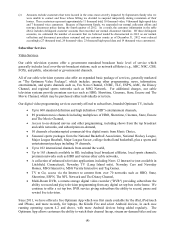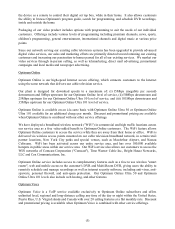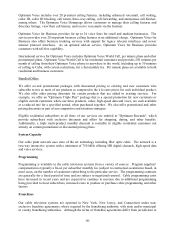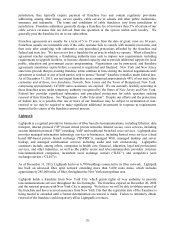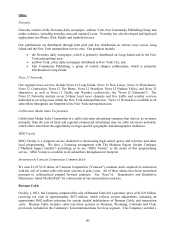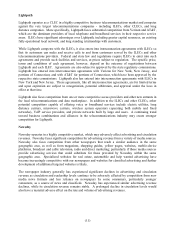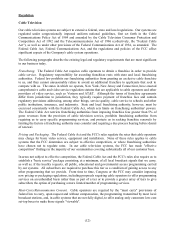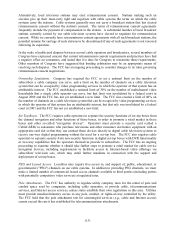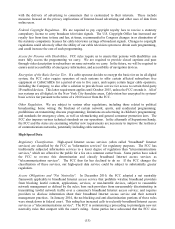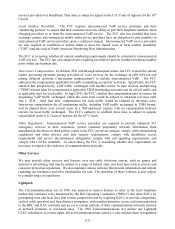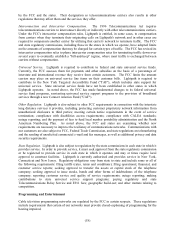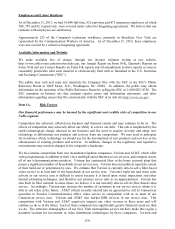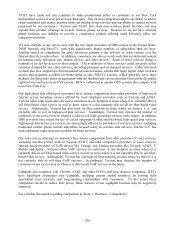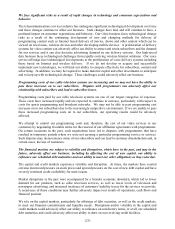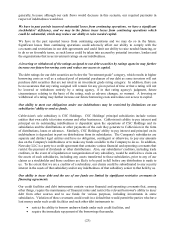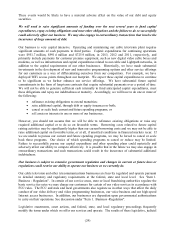Cablevision 2013 Annual Report Download - page 20
Download and view the complete annual report
Please find page 20 of the 2013 Cablevision annual report below. You can navigate through the pages in the report by either clicking on the pages listed below, or by using the keyword search tool below to find specific information within the annual report.(14)
Program Access. In 1992, Congress enacted the "program access" provisions of the Federal Cable Act.
The program access rules prohibit a cable operator from unduly or improperly influencing the decision of
a satellite-delivered cable programming service in which a cable operator holds an attributable interest,
such as AMC Networks, to sell to an unaffiliated distributor. The rules also bar cable-affiliated
programmers from discriminating in the prices, terms, and conditions of sale of a programming service;
permit competing distributors to challenge exclusive distribution arrangements between cable operators
and cable-affiliated programmers if the competitor believes that such arrangements are unfair and
significantly hinder or prevent the competitor from providing satellite cable programming; and allow a
competing distributor to bring complaint against a cable-affiliated terrestrially-delivered programming
service, such as Madison Square Garden Network, or its affiliated cable operator, for acts or practices that
the competitor alleges are unfair or deceptive and that significantly hinder or prevent the competitor from
providing satellite cable programming.
Program Carriage. The FCC's program carriage rules govern disputes between cable operators and
unaffiliated programming services over the terms of carriage. We may not require an unaffiliated
programming service to grant us a financial interest or exclusive carriage rights as a condition of its
carriage on our cable television systems, and we may not discriminate against such programming services
in the terms and conditions of carriage on the basis of their affiliation or nonaffiliation with us.
In 2011, the FCC adopted changes to its program carriage rules, which govern disputes between
programmers and multichannel video programming distributors ("MVPDs") over carriage terms. The
new rules, among other things, clarify what is required for a programmer to establish a prima facie case
under the program carriage rules and clarify a number of procedural issues. In addition, the FCC sought
formal comment on proposals for additional changes to its program carriage rules, including a proposal to
require programmers and MVPDs to enter into "last best offer" style arbitration when they cannot reach
agreement over carriage terms, to expand the scope of the discrimination provision to preclude a
vertically-integrated MVPD from discriminating on the basis of a programming vendor's affiliation with
another MVPD, and a proposal to allow the FCC to require MVPDs that are found to violate the program
carriage rules to pay damages to complainants. The FCC has not yet acted on this proposal. On
October 12, 2011, Game Show Network ("GSN") filed a program carriage complaint against us, alleging
that we discriminated against it in the terms and conditions of carriage based on GSN's lack of affiliation
with us. We believe GSN's claims are without merit and we are defending ourselves vigorously.
Exclusive Access to Multitenant Buildings. The FCC has prohibited cable operators from entering into or
enforcing exclusive agreements with owners of multitenant buildings under which the operator is the only
MVPD with access to the building.
CALM Act. FCC rules require us to ensure that all commercials carried on our cable service comply with
specified volume standards.
Privacy and Data Security. In the course of providing service, we collect certain information about our
subscribers and their use of our services. We also collect certain information regarding potential
subscribers and other individuals. Our collection, use, disclosure and other handling of information is
subject to a variety of Federal and state privacy requirements, including those imposed specifically on
cable operators by the Federal Cable Act. The Communications Act sets limits, subject to certain
exceptions, on our disclosure of that information to third parties. We are subject to data security
requirements, as well as requirements to provide notice to individuals and governmental entities in the
event of certain data security breaches, and public awareness of such breaches may lead to litigation and
enforcement actions or adversely affect our brand. As cable operators provide interactive and other
advanced services, additional privacy and data security requirements may arise either through legislation
or judicial decisions. For example, the Video Privacy Protection Act has been extended to cover
interactive services through which customers can buy or rent movies. In addition, Congress, the Federal
Trade Commission, and other lawmakers and regulators are all considering whether to adopt additional
measures that would impact the collection, use, and disclosure of subscriber information in connection


